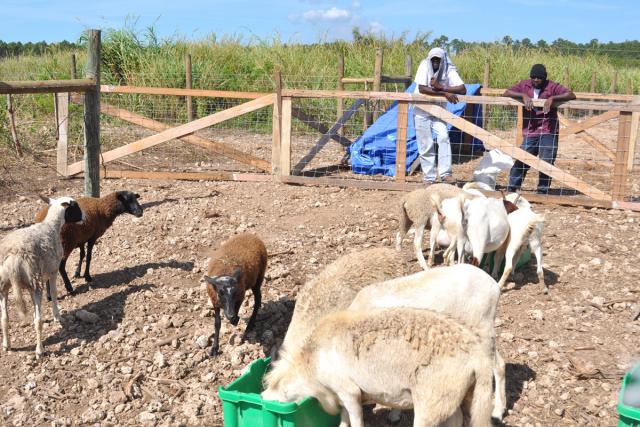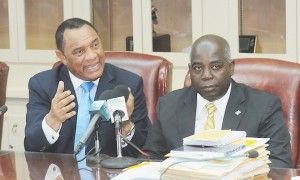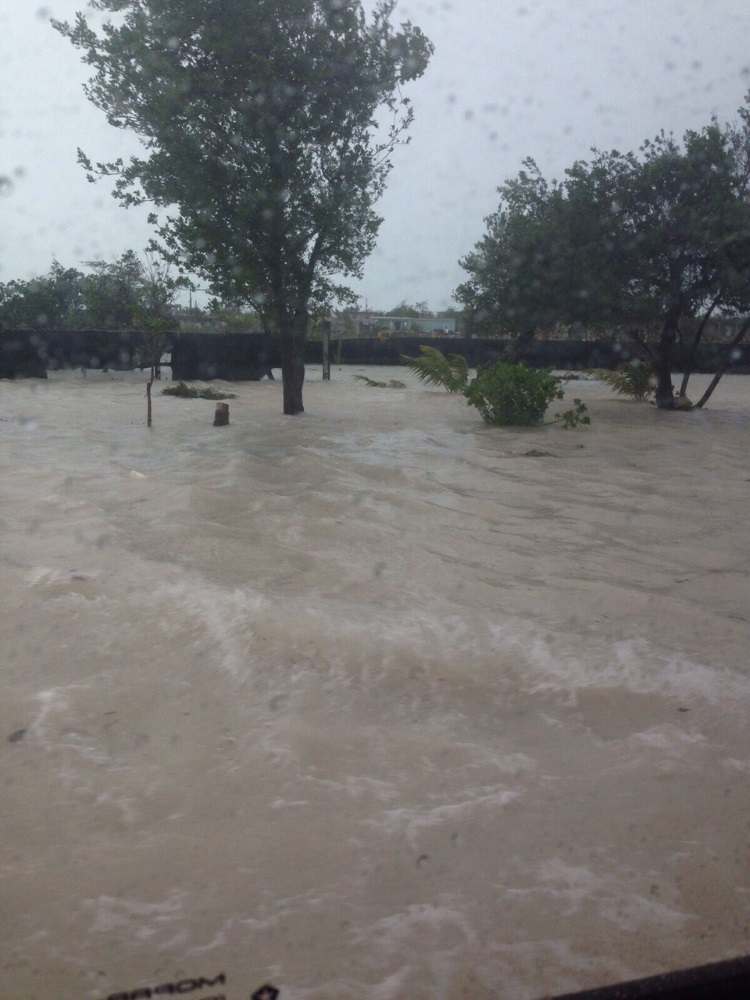News
DPM’s Communication to the House on BAMSI
Published
11 years agoon

Nassau, 11 Mar 2015 –
COMMUNICATION
BY
HON. PHILIP E. DAVIS
MEMBER OF PARLIAMENT
(CAT ISLAND, RUM CAY, AND SAN SALVADOR)
DEPUTY PRIME MINISTER
AND
MINISTER OF WORKS & URBAN DEVELOPMENT
CONCERNING
THE BAHAMAS AGRICULTURAL & MARINE SCIENCE INSTITUTE (BAMSI)
WEDNESDAY, 11th MARCH 2015
HOUSE OF ASSEMBLY
COMMONWEALTH OF THE BAHAMAS
NASSAU, NEW PROVIDENCE
As Delivered
Mr. Speaker
When I stood in this place to give my contribution to the Mid-Year Budget Debate, I determined and said that I would bring an update to the House on the project to construct the Bahamas Agricultural & Marine Science Institute (BAMSI) at North Andros. This communication meets that commitment.
Mr. Speaker
The Bahamas, not unlike the rest of the Caribbean, is faced with an exorbitant food import bill because we have traditionally neglected to work towards maximising our potential when it comes to feeding ourselves. The fact that we also have the added burden of literally feeding our tourism product worsens the whole issue of food imports as the challenge here is to feed others as well.
As a Government, we can sing our praises forever, but when it comes to validation, the eye of an objective outsider rings truth. Most recently, the Director General of the International Labour Organisation (ILO), Mr. Guy Ryder, in referring to the creation of the Bahamas Agriculture and Marine Science Institute (BAMSI) said that The Bahamas has ‘gotten the message’ and is on the ‘right track’ for sustainability.
Mr. Speaker
The message was also echoed several days earlier by the Director-General of the Food & Agriculture Organisation (FAO) José Graziano da Silva, when he urged Heads of Government at the Caribbean Community (CARICOM) Summit to strengthen support to agriculture, to contribute to job creation and tourism revenues, and to protect our economy from external price shocks.
Mr. Speaker
As it stands, The Bahamas imports 85% of the food products it consumes taking our food import bill to nearing US$1 billion. This is a consequence of failure of successive governments to address the circumstance which negatively impacts our economy. When you consider what we have and will potentially lose in terms of jobs and foreign exchange; when you consider that the profits derived from tourism are substantially expended on food imports, there can be no more innovative mechanism to turning our circumstance around than BAMSI.
While we cannot get away from the vulnerabilities which stem from our national composition of many islands, we cannot sit idly by and not make significant strides toward reducing our dependence on food imports.
Mr. Speaker
When this Progressive Liberal Party campaigned for office, our bold statement in our Charter for Governance was: “Now is the time to lay the ground work for a more healthy and secure nation.” Prior to this Government coming to office, two decades saw virtually no public sector investment in infrastructural upgrade, manpower development and public/private sector partnership of food production. Agriculture was on the decline in terms of interest, acreage, and farmers.
BAMSI represents tangible and meaningful steps toward realising a long-held dream of food production, independence, and security for our country. It is mobilising the core ideal of the Progressive Liberal Party that agriculture is an integral part of our sustainable economic development. BAMSI was and remains this Government’s step in the right direction to maximise our national potential and to materialise this goal.
That is the bigger picture, Mr. Speaker
But, if we refine the focus to North Andros alone, Mr. Speaker, we are able to see the awakening of the proverbial sleeping giant. Local Government Administrator Ivan Ferguson reports that his office is bustling since the BAMSI project came to town. Government revenues have increased as more residents are applying for business licences and building permits. Applications for building permits have in fact quadrupled! Residents are busy clearing land! They are building! Indeed, Androsians are positioning themselves to take advantage of the economic benefits that BAMSI will bring.
I am advised that one is hard-pressed to find accommodations because everywhere is occupied – small hotels and apartments. Apartments that have been sitting unused for years have tenants – mostly contractors and their employees. Car rentals have outpaced anything that the area has ever seen. In fact, entrepreneurs have had to secure more rental franchises to meet the demand for transportation.
Mr. Speaker
I am also advised that the shipping industry is reaping major benefits – transporting goods and services directly and indirectly related to BAMSI. Airlift, particularly the air charter business, is equally as profitable with the movement of people attached to BAMSI. I am told that the Ministry of Tourism held a reception for winter residents of that area and that the attendance was greatest ever – and invariably, they all were excited about BAMSI.
Mr. Speaker
The excitement about BAMSI is even more tangible among the locals. Store owners are having good sales. More restaurants are opening. Those that exist are taking in the largest sales ever. Farmers that had just about given up on the industry have gone back to cultivating their farms.
This, Mr. Speaker, is the Big Picture!
The Opposition went on a fishing expedition to BAMSI the other day. What a production they made about their experience there. What they didn’t talk about was the excellent workmanship that the contractors have displayed in their construction. They have not said that these men and women – all Androsians or rooted in Andros – are creating what will be the wonder of the Caribbean. When you go into those buildings, you see the work of ace contractors – men like Solomon Roberts, Bennett Knowles, Prince Mackey, Hugh Fowler, Cecil Marshall, Sidney Cargill, McGregor Russell, and Brudienell Kelly, among others.
Not one word did they utter about BAMSI having already established 68 acres of banana, papaya, plantain, peanut, coconut, and lime crop in the ground and moving the economy. They are not interested in the fact that harvesting has started with banana yielding over 5,000 pounds per week and papaya yielding 6,000 pounds per week. These two products alone have generated revenue in the amount of approximately $7,500 weekly. When these crops have expanded in acreage and the additional crops introduced, the projected weekly revenue is expected to be $52,000. But they are not interested in that!
They have not told us about the land that is being cleared to accelerate the crop production programme, where 150 new acres of crop including banana, papaya, pineapple, and lime. They have not talked about the additional acreages for navel oranges, mangoes, avocado, and sour sop.
I know they have not been listening for any good that this Government can bring, so they missed the fact that an aggressive intercropping programme is on the way to produce acres and acres of watermelon, cantaloupe and honey dew melons.
In total, Mr. Speaker
The area under crop cultivation by the end of June will be 450 acres of crop with 200 acres for the rotation cycles and 90 acres in inter and companion cropping. 650 acres will be fully occupied. That is the big picture!
I have not even gone into the livestock, poultry and fisheries aspect of BAMSI, Mr. Speaker, and the excitement generated by this revolutionary project is already immeasurable.
We have only just begun with BAMSI and five farmers have already been granted licenses to produce under the BAMSI label. These farmers are producing vegetables such as tomatoes, cabbage, onion, sweet pepper and hot pepper. This is the big picture!
We have only just begun and there are 39 students enrolled at the Institute in various programmes and skills training. There are also 50 Androsians fully employed at BAMSI.
That is the big picture!!
But, Mr. Speaker
Chuck Palahniuk once said that “the trick to forgetting the big picture is to look at everything close up.” So it is with BAMSI and the consequential position of the male dormitory that was gutted by fire, the work of an arsonist. The political pundits and supporters now offer the distraction of chatter concerning the fire. Notwithstanding, we are not distracted and we are not deterred. We will rebuild; and from the ashes of that fire, BAMSI is rising to continue our push forward to feed ourselves.
Mr. Speaker
I know that it is of paramount importance that I should give accurate and truthful information to Parliament, correcting any inadvertent error at the earliest opportunity. When I last spoke, my advice was that “at the contract’s signing, the contractor [for the male student dormitory at BAMSI] had everything that was required to contract work with my Ministry, including Contractor’s All-Risk Insurance.”
Mr. Speaker
The files in relation to this contract was provided to me on Monday, 2nd March 2015. I have reviewed them and the following details are now presented as verifiable facts.
On 30th January 2014, Government approved construction for the BAMSI project and noted that the construction of the student dormitories, among other buildings, was critical to the Institute’s opening for September of that year.
Consequently, on 6th February 2014, my Ministry issued a Letter of Intent to contract Mr. Audley Hanna, trading as Paradigm Construction, to build the male student dormitory for the base amount of B$2.6Million. The contractor was notified that formal contract documents would be prepared; and that mobilisation payment would be processed as soon as the Ministry was in receipt of the contractor’s Business Licence, All Risk Insurance and National Insurance Compliance Letter.
On 10th February 2014, the contractor requested 20% mobilisation payment. The normal course of action provides that at mobilisation, that is the first payment toward satisfaction of a contract, the following must be available:
A Contract or Letter of Intent duly signed by the Permanent Secretary;
The original claim letter from the contractor, requesting payment. The letter shall be duly signed by the contractor;
A copy of the Bill of Quantities/Scope of Works/Schedule of Works, which is part of the contract document;
The original “Contractors All Risk Insurance”, including Public Liability of not less than $1,000,000.00;
Copy of current business license;
Current “National Insurance Board” (NIB) compliance letter; and
The original Contractor’s Performance Bond, if applicable.
The contract was duly executed on 21st February 2014 at North Andros.
Mr. Speaker
There were several indicators that led me personally examining the relevant file concerning the insurance of the male dormitory. I am now in a position to say that the contractor provided all that he was required, save a certificate for All Risk Insurance. What the contractor did provide was only a quotation of cost from RoyalStar Assurance for All Risk Insurance for a six-month period from commencement of the project. It is noted that mobilisation was issued thereafter. What the file does not tell me is who took the decision to advance the mobilisation without the requisite insurance, what intervention, if any, was made to ensure that this requirement was met once identified, and why the contract, which has been substantially delayed, was allowed to continue without this critical requirement.
Mr. Speaker
In the Construction Industry, large-project contractors generally maintain some type of all risk insurance – even when not engaged in any projects – so as to ensure that when an opportunity arises, he is ready for competition. Smaller contractors, on the other hand, are usually not able to afford continual insurance as many of them live from project to project and those projects may be few and far between. They, therefore, tend to engage insurance on a project-by-project basis, lasting the projected length of a contract.
Mr. Speaker
This Government has historically been about giving those in need a hand up. However, there can be no plausible explanation for an administrative error such as that which has occurred in this case. I should not speculate that any agreement existed, but if there was an agreement for the Ministry to advance the premium to the insurance company from the contractor’s mobilisation payment, this should have been done. I mention this because I am advised that this has been done in the past to assist contractors’ qualification for contractual works. In this case, however, it was incumbent on the contractor, having been paid full mobilisation, to ensure that the insurance premium, which was a mere $23,746.65, was paid immediately. If he had done so, a certificate of insurance would have been included on our file. From the outset, therefore, the contractor was in breach.
So, Mr. Speaker
This is where we are. Given the fact that the dormitory was not complete and has not been turned over to the Government, by contract, the contractor stands fully liable for the construction outlay to date, which totals $2,550.864.15. My Ministry is now making a determination as to how we will recover this loss from the contractor.
Since the fire, two options have been determined. The first is to gut the building to its foundation and rebuild, given the fact that the fire tested the entrails of the building. The second is total demolition to rebuild a new structure. Estimates in hand target the reconstruction cost at around $5.5Million. The increase in cost takes into consideration the cost to reconfigure the units from single to double occupancy, ordinary inflation, and VAT.
Consequently, the net cost to Government will be the cost of reconstruction, less the expenditure for the structure destroyed by fire. That is to say, just under $3Million.
Mr. Speaker
I am constrained to call out the actions of technical officers whose duty it is to be good stewards of the people’s money and to lessen Governments’ exposure to potentially embarrassing situations.
Given the experience of my technical team and the checks and balances of our bureaucracy, there was no reason to suppose that such an administrative error would be missed for so long. Beyond that, the public fully and rightly expects all Government officials to be above reproach in protecting the public’s interests. These citizens, our constituents, depend on officials to act in the public good, to know their roles well, to do their jobs efficiently, and to be honest in their handling of public resources, avoiding even the opportunity for, or the appearance of, impropriety. The Public Service provides the remedies that should ordinarily flow from matters such as this, particularly how best to manage them and how best to learn from them.
For my Ministry, notwithstanding its difficulty, I should hope that this matter is taken as a learning tool. Bringing BAMSI to the point of service as initially envisioned by Government remains our top priority. Taking in the holistic challenge presented by the BAMSI project, my Ministry has engaged the service of a Project Management firm and is in the process of engaging an Employer’s Representative to guide this process to completion expeditiously.
Mr. Speaker
While what has transpired is an avoidable error on the part of the Ministry, I do not think that any reasonable person would find malicious intent. On the other hand, that cannot be said with respect to the arson, which, if proved, was criminally intended to deprive the Bahamian people of the full benefit and impact of a vision that is becoming reality.
But try as they may, Mr. Speaker
This Government’s visions and dreams and hard work toward realising them will not be destroyed. BAMSI’s dawn has been unveiled. We look forward to it reaching its full potential, contributing to the change that we envision for The Bahamas and the Bahamian people.
Mr. Speaker
As I conclude, for the sake of transparency, I table copies of the following documents:
The Contract for the Construction of the Male Student Dormitory for the Bahamas Agriculture & Marine Science Institute with Paradigm Construction Company
Mobilisation Payment Certificate Routing Sheet with its annexes to include:
Letter of Intent to Contract Works
Letter of Acceptance from Contractor
Letter from Contractor Requesting Mobilisation
Business Licence for Paradigm Construction Company Ltd
National Insurance Board Letter of Good Standing
Contractors’ All Risk Insurance Quotation from RoyalStar Assurance
Architectural Unit Request for Mobilisation; and finally
Balance Sheet for Male Student Dormitory at BAMSI (Paradigm Construction) from commencement to the date of the fire.
Thank you, Mr. Speaker.
Magnetic Media is a Telly Award winning multi-media company specializing in creating compelling and socially uplifting TV and Radio broadcast programming as a means for advertising and public relations exposure for its clients.

News
Commonsense, Not Confrontation: Why Kamla Persad-Bissessar Is Right
Published
3 weeks agoon
December 27, 2025
This debate did not start with Donald Trump, and it did not start this month.
For more than a decade, this reporter has had a front-row seat to repeated, urgent calls from across the Caribbean for stronger intervention by the United States in response to gun- and narcotics-fuelled violence that has hollowed out our communities. Long before today’s headlines, leaders warned that transnational gangs were outgunning police, draining public resources and stealing our youngest people.
Much of the public messaging leaned toward calls for fewer guns flowing from the United States, but the practical response from Washington evolved into something else: tactical undergirding of the Caribbean. Training, intelligence sharing, maritime surveillance and joint operations expanded under successive U.S. administrations — Republican and Democrat alike.
Then came Venezuela.
President Nicolás Maduro proved himself an unhinged and destabilising force, openly threatening Guyana’s oil-rich territory and pushing the region to the brink of a conflict no Caribbean state could afford. The United States showed up. The threat of war was blunted. That mattered.
But while geopolitical flames were contained, the narcotics trade exploded.
CARICOM convened emergency meetings on transnational gang violence. Crime became so pervasive that it was formally classified as a public health threat. Entire communities were terrorised. Courts clogged. Police forces stretched beyond capacity.
And now — quietly but noticeably — the tempo has shifted.
While no single forensic study can capture the full picture, it is easily verifiable on the ground that major narcotics busts and trafficking activity have slowed in recent months. Something has changed. Pressure works.
This is the reality Prime Minister Kamla Persad-Bissessar is responding to.
Her critics accuse her of breaking ranks. What she is actually doing is refusing to indulge in strategic hypocrisy — demanding international help to confront narco-terrorism while appearing to defend or excuse the very networks and actors we have spent years condemning.
Sovereignty is not an insult. The Caribbean invokes it constantly. To deny it to the United States — especially when the policies in question were telegraphed months in advance and remain adjustable — is not diplomacy. It is posturing.
What is most troubling is the region’s selective memory. CARICOM has directed months of rhetorical fire at Trump-era policies, yet when disaster struck — from security crises to Hurricane Melissa — the United States remained one of the region’s most reliable supporters. Outcomes matter more than allegiance theatre.
Kamla Persad-Bissessar is not suffering from Trump Derangement Syndrome. She is applying commonsense statecraft. She understands that small states do not gain leverage by moral outrage alone, and that credibility is lost when we appear aligned with individuals, regimes or activities we ourselves have deemed a threat.
Her warning to CARICOM is simple and necessary: do not undermine your own cause.
The Caribbean’s fight against narco-violence, corruption and instability has been long, costly and painful. If pressure is finally producing results, we should be wise enough to recognise it — and brave enough to say so.
Angle by Deandrea Hamilton. Built with ChatGPT (AI). Magnetic Media — CAPTURING LIFE.
News
Beaches Turks and Caicos Showcases and Supports Local Creativity
Published
4 months agoon
September 12, 2025
September 12, 2025
PROVIDENCIALES, Turks & Caicos Islands – The Turks and Caicos Islands are home to a wealth of creativity, from artisans and craft vendors to musicians and performers. Beaches Turks and Caicos, the Caribbean’s leading all-inclusive family resort, has pledged its continued support for these individuals by providing meaningful platforms for them to share their skills and stories with guests from around the world.
The resort’s commitment is most evident in its weekly Cultural Night showcase, where visitors are immersed in the vibrant traditions of the islands. Guests enjoy live performances which feature local music genres such as ripsaw, while artisans display and sell handmade creations. This event not only enriches the guest experience but also strengthens economic opportunities for local entrepreneurs.
Entertainment Division Manager Garett Bailey emphasized the significance of Cultural Night, “we want to showcase everything the Turks and Caicos Islands culture has to offer. Our goal is for guests to leave with a deeper appreciation of the island’s art, music and traditions, while giving local talent the opportunity to share their creativity with visitors from across the globe.”
Beyond Cultural Night, Beaches Turks and Caicos also welcomes local craft vendors onto the resort every Wednesday and Friday where they are offered a direct space to market their goods. Guests have easy access to the Turks and Caicos Cultural Marketplace, where they can purchase authentic local arts and crafts.
where they are offered a direct space to market their goods. Guests have easy access to the Turks and Caicos Cultural Marketplace, where they can purchase authentic local arts and crafts.
Managing Director, James McAnally, highlighted how these initiatives reflect the resort’s broader mission, “we are committed to celebrating and sharing the vibrant culture of these islands with our guests. By showcasing local artistry and music, we not only provide entertainment but also help sustain and grow the creative industries of the Turks and Caicos Islands. From our cultural showcases to nightly live music, we are proud to create authentic connections between our guests and the people of these islands.”
Local musician Keon Hall, who frequently performs at the resort, expressed gratitude for the ongoing partnership, “being able to share my music with Beaches’ guests has created lasting relationships. Some visitors return year after year and request songs from previous performances. This partnership continues to celebrate what we do and strengthens the bond between local artists and the resort.”
The resort’s support of local artisans and entertainers extends beyond business opportunity; it is about preserving heritage and sharing stories. Guests take home more than souvenirs; they leave with experiences that deepen their understanding of Turks and Caicos’ culture and history.
Public Relations Manager, Orville Morgan, noted the importance of this commitment, “for many visitors, these interactions represent their first genuine connection to the Turks and Caicos Islands. From artisans and musicians to farmers and transport operators, our local talent helps shape every guest experience. At Beaches, we are proud to give them the stage to share their stories and their heritage.”
Beaches Turks & Caicos remains dedicated to developing cultural connections and supporting the artisans, musicians and entrepreneurs whose creativity makes the Turks and Caicos Islands unique. Each guest experience is an opportunity to celebrate and sustain the spirit of the islands.
Caribbean News
“Barbecue” is Cooked! US Turns Over 11 Million Haitians into Potential Informants with $5 Million Bounty
Published
5 months agoon
August 12, 2025
August 12, 2025
The United States just set fire to the underworld in Haiti — and this time, the smoke might finally flush out the man many call the most feared in the Caribbean.
On Tuesday, the U.S. government slapped a $5 million bounty on the head of Jimmy “Barbecue” Chérizier, the ex-police officer turned gang boss accused of orchestrating massacres, torching neighborhoods, and strangling Haiti’s capital into chaos. This isn’t just a headline — it’s a full-blown game-changer.
turned gang boss accused of orchestrating massacres, torching neighborhoods, and strangling Haiti’s capital into chaos. This isn’t just a headline — it’s a full-blown game-changer.
That kind of cash — offered under the State Department’s Transnational Organized Crime Rewards Program — is enough to turn the country’s entire population, more than 11 million people, into potential informants overnight. Add the millions in the Haitian diaspora, and Chérizier isn’t just wanted. He’s surrounded.
The Number That Changes Everything
Five million U.S. dollars today equals about 655 million Haitian Gourdes. In a country where many scrape by on less than $5 a day, that’s not just life-changing — it’s life-defining. It’s enough to rebuild homes, put generations through school, or buy a one-way ticket far from the gunfire.
In a place where trust is scarce and survival is everything, that figure is more than tempting — it’s irresistible. For Chérizier, it means every friend could be a future informant, and every loyalist might be calculating the cost of staying loyal.
‘We Will Find Them’ — Jeanine Pirro, U.S. Attorney
Jeanine “Judge Jeanine” Pirro, the U.S. Attorney, set the tone with fire in her voice. “This indictment is the first of its kind,” she announced. “Jimmy Chérizier, also known as ‘Barbecue,’ is a notorious gang leader from Haiti who has orchestrated and committed various acts of violence against Haitians, including the 2018 La Saline attack in which approximately 71 people were killed. He both planned and participated in that massacre.
“Anyone who is giving money to ‘Barbecue’ cannot say, ‘I didn’t know.’ They will be prosecuted, and we will find them. They are supporting an individual who is committing human rights abuses, and we will not look the other way.”
Pirro wasn’t just going after Chérizier. She was sending a warning to the Haitian diaspora accused of feeding his war chest from abroad: the days of claiming ignorance are over.
‘No Safe Haven’ — Darren Cox, FBI
Then came Darren Cox, Deputy Assistant Director of the FBI, delivering the muscle of America’s most powerful investigative force. “There is no safe haven for Chérizier and his network,” Cox declared. “We are closing every link, every cell.” Since January, he said, the FBI has arrested three Top Ten fugitives, taken more than 19,000 criminals off the streets, and seized thousands of tons of narcotics — enough to save millions of lives across the U.S.
The FBI’s Miami and Houston offices have already bagged one of Chérizier’s Viv Ansanm associates inside the United States without firing a shot. “These efforts are a deliberate and coordinated plan,” Cox said, “to protect our communities and confront escalating threats from terrorist organizations like Viv Ansanm.”
‘Three-Year Investigation’ — Ivan Arvelo, HSI
Ivan Arvelo, Assistant Director of Homeland Security Investigations, brought the receipts. “This is the result of a three-year investigation into Chérizier’s procurement networks, cash pipelines, and operational financing that violates sanctions,” he explained. Arvelo described 400 structures destroyed, entire communities erased, and a gang exploiting U.S. dollars, technology, and immigration loopholes to keep its killing machine running. “We tracked how Americans unwittingly bankrolled brutality,” he said — proof that the net is tightening both inside Haiti and abroad.
‘The Worst of the Worst’ — Chris Lambert, State Department
Chris Lambert, representing the State Department’s International Affairs division, gave the political bottom line.
“Mass violence in Haiti must end,” Lambert said. “The instability resulting from Chérizier’s actions fuels illegal migration, regional instability, and transnational crime. We will continue to apply every tool available — including our rewards programs — to stop the spread of unchecked violence, especially to target the worst of the worst criminal leaders threatening the people of our hemisphere.”
instability, and transnational crime. We will continue to apply every tool available — including our rewards programs — to stop the spread of unchecked violence, especially to target the worst of the worst criminal leaders threatening the people of our hemisphere.”
Lambert confirmed what many have long known: Chérizier is not just a gang leader. He commands Viv Ansanm, officially designated in May as a Foreign Terrorist Organization. In the eyes of the U.S., that makes him not just Haiti’s problem — but everyone’s.
Why Haitians May Not Resist
In Haiti, money talks — loudly. And when you put 655 million Gourdes on the table, it shouts.
That’s the kind of figure that turns casual acquaintances into informants and makes even the most hardened loyalist wonder if the payout is worth more than the risk. It’s not a matter of “if” word gets out, it’s a matter of “who will be first to collect.”
For grieving families, it’s a chance at justice. For the desperate, it’s a chance at survival. For Haiti as a whole, it’s hope — wrapped in the most dangerous of temptations.
An Answer to Prayers
For years, Haiti’s headlines have been a scroll of horrors — kidnappings, executions, burned neighborhoods, bodies in the streets. Chérizier’s name has been attached to too many of them.
This move by the U.S. isn’t just strategy. It’s personal. It’s a signal to every Haitian — at home or abroad — that the days of impunity could be ending.
I’ll admit it: when I heard the news, I danced, I sang, and I nearly cried. Not because $5 million is a lot of money, but because of what it means — the possibility, at last, of stopping the man accused of helping turn Haiti into hell on earth.
Four officials, four angles, one mission: Pirro’s fire, Cox’s grit, Arvelo’s precision, Lambert’s conviction. Together, they’ve put the heat on “Barbecue” like never before.
BBQ is cooked. The only question now is: which one of over 11 million potential informants will serve him up?










